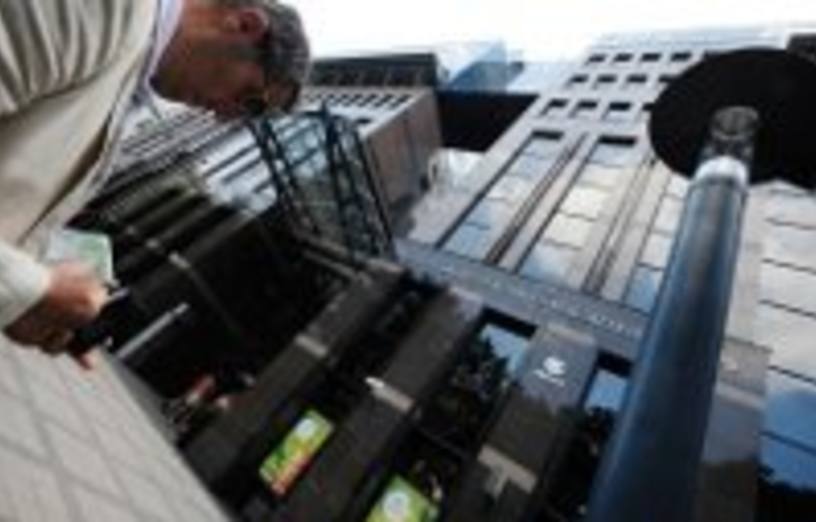Hungary created waves in the spring when it announced it would seek to levy a 'Robin Hood' tax on the country's banks to plug a gap in the national finances.
It was not the fact that a bank tax was being implemented that caused a stir - similar proposals had been under discussion in Germany and the UK - but its scale. The Ft200bn (€712m) the government sought to raise each year for three years was larger in scale than anything contemplated elsewhere, amounting to 4.5% of gross domestic product (GDP).
The announcement of the banking tax came shortly after elections in which Fidesz, a populist, socially conservative party, had come to power on the back of promises to pass through dramatic tax cuts and restore central Europe's slowest-growing economy to prosperity.
"We helped the banks when they were in crisis," said Viktor Orbán, the new prime minister, shortly after his party won its landslide victory. "Now it is the banks' turn to help the country."
It is an argument that caused bankers to raise their eyebrows. György Surányi, a former central bank governor and now head of the Italian bank Intesa Sanpaolo's operations in central and eastern Europe, says: "None of the banks received a cent of public money in the crisis - neither a subsidy nor a capital increase." The two independent banks - OTP, the country's largest, and FHB, a mortgage bank - received a credit line, which has since been repaid with interest.
By contrast, the foreign-owned banks that account for 70% of total assets in the banking system were able to rely entirely on their parents for finance.
In October 2008, when the credit crunch that followed the collapse of Lehman Brothers left Hungary's public and private sectors with foreign currency-denominated liabilities and no access to capital, the primarily Austrian and Italian foreign mother banks moved swiftly to plug their subsidiaries' financing gap. That month, capital transfers from headquarters to Budapest leapt from an average monthly level of about €500m a month to €2.8bn in October alone - more than one-tenth of the €20bn bail-out that Hungary eventually received from the International Monetary Fund (IMF) and the EU - and were sustained at higher levels for some time afterwards.
Julia Kiraly, deputy governor of the National Bank of Hungary with responsibility for financial stability, echoes this point. "During the liquidity crisis at the end of 2008, the mother banks increased their exposure to Hungary, strengthening their subsidiaries' balance sheets, because they really believe in the long-term business strategy."

Viktor Orbán, the new prime minister of Hungary
Post-election comedown
Given the support that was provided at the time, and the formal commitments that regional banking groups made to the IMF not to reduce their exposure to eastern Europe at the height of the credit crunch, many have felt aggrieved at the post-election turn of events.
Mr Orbán, the new prime minister, has been careful to distance himself from claims that he is running an anti-banking crusade. In a speech marking his first 100 days in office, he said: "Many are patting me on the back because of the banking tax, but I've never wanted to be the Che Guevara of the anti-bank struggle." The tax was a "necessity, not an achievement".
In spring this year, voters returned Mr Orbán and his party to power after eight years in the wilderness. Fidesz's victory, which netted it more than two-thirds of the seats in parliament, and was unprecedented in Hungary's 20 years of democracy, reflected voters' dissatisfaction at austerity resulting from years of sluggish growth and the emergency stabilisation programme that followed the financial crisis.
But promises of tax cuts and a swift return to growth were always going to be hard to fulfil: Mr Orbán was apparently banking on securing the agreement of the IMF and the EU to run a significantly higher budget deficit than Hungary had agreed to under its standby loan agreement. When José Manuel Barroso, the president of the European Commission, scotched this plan at a Brussels meeting just days after the election, the bank levy appeared to be the only source of financing with which earlier promises of tax cuts could be met.
Not that the promise to cut taxes was entirely uncalled for. Hungary has a large state and generous levels of social spending by regional standards. Government spending accounts for 49.2% of GDP, compared with an average of 40.3% for neighbouring countries, financed by effective levies nearing 50% on a relatively narrow tax base.
"It's quite clear that the government thinks that it just needs adequate stimulus, whether from outside or inside," says Peter Felcsuti, who is standing down as chairman of the Hungarian subsidiaries of Austrian bank Raiffeisen after 20 years. "But this philosophy is very simplified and, I think, wrong. Hungary's growth potential is small, especially because structural reforms have not taken place: the spending systems are not efficient and the state is still very large."
And the bank tax is only part of the social burden that the government appears to be planning to shift onto the banks. Since its announcement, further measures have been announced whose effect is in part to shift the social cost resulting from the fall in the forint from borrowers to the banks themselves.
Fully two-thirds of all personal and small business loans in Hungary are denominated in foreign currencies, primarily in Swiss francs. With the forint down from record highs just over two years ago to record lows now against the euro and especially against a Swiss franc, which has emerged as a haven for investors worried about the eurozone, banks have seen a steady rise in non-performing loans. Borrowers, meanwhile, are seeing mortgage payments rise sharply.
Shortly after announcing the banking tax, the government ordered a moratorium on repossessions. This was followed in mid-September by further proposals - which have yet to become law - which will further shift risk from borrower to lender.
Among the eight proposals, for example, is one that will make it impossible for borrowers to owe more to the bank than the current value of the property.
Given the moratorium that is already in place, many are scratching their heads wondering how the value of a property is to be established.
"How are you meant to value the property?" asks Sean Morrissey, chief executive of Budapest Bank, the Hungarian subsidiary of GE Money. "Does it include or exclude foreign exchange movements, for example?"
This requirement was just one of eight unveiled by two opposition MPs in mid-September, as part of a package designed to help those with a foreign currency mortgage.
The package includes provisions such as a requirement that the terms of a contract cannot be changed if it is disadvantageous to the borrower, that the bank be required to calculate payments using the median exchange rate, and a prohibition on the bank demanding interest, late fees or any other penalties in the case of an extended inability to pay.
"The government is in a trap," says Mr Felcsuti. "They want to help the foreign currency debtors, but they don't have the money to do so, and so they want to get the banks to pay."

Julia Kiraly, deputy governor, National Bank of Hungary

György Surányi, head of Intesa Sanpaolo's operations in central and eastern Europe

Peter Felcsuti, chairman, Raiffeisen Bank
Moral hazard
Most critics of the proposals agree that they also create the potential for moral hazard.
The responsible lending decree agreed between the government, the banking regulator and the banks last year, before the change of government, set tighter credit conditions for lending, but, Ms Kiraly says: "The non-performing loan [NPL] ratio, even for new loans signed since the implementation of the responsible lending regulation was agreed on, has been rising."
It is believed that the National Bank is studying whether the link between delinquency and the government's proposals is more than just coincidental.
In a difficult economic climate it is natural that banks will do their share of suffering, says Mr Morrissey. "Banks are willing to try to help solve the fundamental challenges the market is facing." But the burdens being shifted onto the banks are hard to deal with both because of their size and their unpredictability.
"You can't just price $1bn [the banking tax] into your business," he says. Mr Morrissey, and other bankers, complain also that little consultation preceded many of the measures announced. Though a chorus of dismay forced from the government a commitment to cut the duration of the banking tax from three years to two, other measures came as a shock to market participants.
Since the latest measures were proposed by two individual backbench MPs, for example, they will not need to pass through the normal series of consultations and committee hearings that ordinary government-sponsored legislation is subject to. Yet, with the government's secure parliamentary majority, it should have no trouble enacting the legislation.
While the central bank has criticised many of the measures, Ms Kiraly nonetheless argues that some regulatory tightening is needed.
"We have seen the banks shifting their burdens onto customers, especially in the retail market. Households have been expected to pay not just for a fall in the forint but also for increases in banks' funding costs and loan loss provisioning," she says.
In the past, banks have been prone to compete not on price, but on the amount of risk they were prepared to place on the table by offering riskier products and taking on riskier clients. This, Ms Kiraly points out, was the origin of foreign currency lending in Hungary.
"It started in the car loans business in the late 1990s, when the foreign banks' leasing companies started offering Swiss franc loans with lower interest rates: their access to foreign currency funding was their competitive edge." Stricter regulation should push the market back towards price-based competition, she says.
Despite this, Ms Kiraly feels the focus on regulating the problem away is a mistake.
"We expected the NPL ratio to peak at 10% to 15%, and we are more or less there now," she says. The challenge is to get banks lending more. "If banks started lending more actively then they can grow out their bad loan portfolio. So banks have to be encouraged to create a virtuous circle, by increasing lending activity to export-exposed small and medium-sized enterprises."
The existing stock of foreign currency debt places the banks in a paradoxical position when it comes to setting rates, meaning that conventional currency devaluation is not an easy option.
"In theory, cutting rates and letting the currency devalue will help exports. But we have a perverse effect to deal with: pushing the forint down curbs household spending, investment and consumption because of the higher instalments foreign-currency debtors pay on their loans, and so it can place a burden on growth," says Ms Kiraly.
The irony is that the banking sector is well on its way back to health, she adds. "From the point of view of capital adequacy, Hungary's banks are among the strongest. Capital adequacy ratios are above 12%, Tier 1 capital is above 10%." OTP bank, which without a foreign parent is reliant on market funding, and which was being watched closely for signs that it would stumble at the height of the liquidity squeeze, did second best in Europe in recent continent-wide stress tests, Ms Kiraly notes.
Rather than trying to regulate banks in order to circumvent the NPL problem, she suggests other instruments of public policy be used. "We have 95% home ownership in Hungary; elsewhere you have more developed systems of public housing for rent," says Ms Kiraly.
An anti-bank president?
Mr Orbán insists that he is no anti-bank Che Guevara. Nonetheless, current attempts to hem in banks with detailed legislation look unlikely to deliver the lending growth needed to put Hungary back on a growth path. Although the economy is forecast to grow 2.5% in 2011 after years of stagnation and recession, much of that is predicated on strong export growth.
While some expect consolidation in Hungary's banking sector - there are seven major high street banks - few expect any to leave the market. But all the banks in the country are regional players, and have other places to allocate their capital.
"This may not be good for the government," says Mr Felcsuti. "For growth, you need normal credit growth - but there may be less of that than needed."












